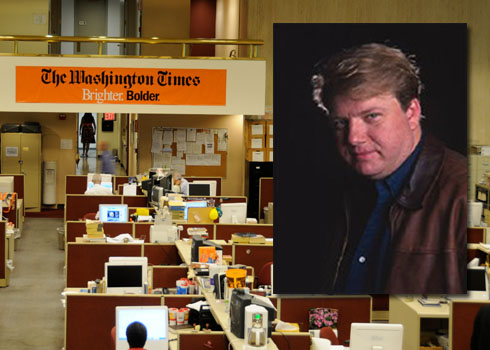A wide-ranging affidavit by Washington Times editorial page editor Richard Miniter in the lawsuit he is filing against the Times provides a detailed picture of the inner workings of the newspaper that has been rocked in recent weeks by the canning of three executives and the resignation of its top editor.
Budget meetings Miniter attended show that the newspaper relies on a roughly $40 million annual subsidy, delivered weekly, from the Unification Church, he alleges in the affidavit. Church leader Rev. Sun Myung Moon founded the Times and his son Preston controls its parent company. Miniter writes:
70. Based on what I learned in budget meetings, the paper relies on a roughly $40 million annual subsidy from the Unification Church and cannot survive without that subsidy, which is paid in weekly amounts. Of the slightly more $70 million the Washington Times spends annually, less than $37 million comes from advertising and subscription revenue. In addition, the number of paid subscribers has been falling since July 2008 and advertising revenue is plunging as competition from the Washington Examiner and others intensifies.
The affidavit says that Miniter, who was hired at a salary of $225,000 — plus a $5,000 signing bonus, a health club membership, and other benefits — suffered medical and emotional stress because of how he was treated at the newspaper.
Miniter lawyer Larry Klayman, who sent the affidavit to TPM, said it would be included with a suit filed in federal court today or tomorrow. (The Miniter camp had previously said they would file last week.)
Following an order in June by then-Times publisher Tom McDevitt that he work from home, Miniter felt “trapped” because he could not perform his work, but was stuck in the position, according to the affidavit. “During this period, I felt profound emotional distress and physical pain, including headaches, back pain, loss of sleep, weight gain and other maladies.”
The affidavit alleges that the Times human resources chief repeatedly asked Miniter to sign a document stating her son lived at his house so the boy could continue to attend an Arlington, Virginia, elementary school after he had moved to Maryland. It also describes two internal Times investigations into Miniter, launched, he says, for retaliatory reasons. In one, an outside consultant was brought in to “conduct what she called a ‘360’ in which every employee who reported to me was privately interviewed.”
The Times spokesman has not returned calls for comment, but the publisher of the paper previously dismissed as baseless Miniter’s charges in a discrimination complaint to the Equal Employment Opportunity Commission. Miniter is today still listed prominently on the paper’s masthead.
Also touched on in the affidavit is the Unification Church religious ceremony — including a mass wedding, though that is not specifically mentioned in the affidavit — Miniter says he was made to attend earlier this year. The Washington Post previously reported that Miniter said the New York City ceremony was in December, but the affidavit gives the date as roughly Jan. 31 of this year. The affidavit details why Miniter, who at the time was serving as a consultant for the paper, felt pressured to go:
21. McDevitt told me that “It would be good for you to go.” I took this to mean that if I didn’t go, it would count negatively against my prospects at The Washington Times and of being offered permanent executive employment there.
22. I knew that McDevitt was a member of the Unification Church and that his religion was important to him. A large, Mao-like portrait of Rev. Moon hung above his desk and a billboard-sized Korean-language calligraphy, written by Rev. Moon, hung in the executive conference room. While these Moon relics were only seen by senior executives, I knew they had personal significance to McDevitt. At first, I considered this artwork to be a sign of personal and private religious devotion, like an Advent calendar tacked to someone’s cubicle, and not a sign that the Church would interfere in the “editorial independence” that editors were promised.
The affidavit describes a rigorous screening process before he was hired, including a three hour “computerized test designed to reveal hidden psychological and behavioral factors.” Miniter says a former Wall Street Journal colleague asked, “Are you going to work for the CIA or something?”
Late 11/24/09 Update: Reached by TPM this afternoon, Miniter and Klayman said they were delaying the filing of the lawsuit once again because they have been trying — so far unsuccessfully, they say — to reach a settlement with the Times. Klayman, who originally said the suit would be filed last Friday, says he has sent a copy of the affidavit and the draft complaint to a lawyer for the Times. All this can probably be read as routine legal maneuvering.









